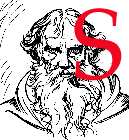[Spencer's “On Education” originally appeared in the Westminster Review. This text has comes from the Project Gutenberg online version of the Everyman edition of Essays of Education — George P. Landow]

pencer is particularly savage when attacking Victorian emphasis upon teaching the Latin and Greek classics instead of subjects he believes essential for self-development and a healthy society — subjects that include not only the natural sciences but drawing. As he points out, “Men who would blush if caught saying Iphigénia instead of Iphigenía, or would resent as an insult any imputation of ignorance respecting the fabled labours of a fabled demi-god, show not the slightest shame in confessing that they do not know where the Eustachian tubes are, what are the actions of the spinal cord, what is the normal rate of pulsation, or how the lungs are inflated.” Classical education for Spencer is an education only about the past: “While anxious that their sons should be well up in the superstitions of two thousand years ago, they care not that they should be taught anything about the structure and functions of their own bodies—nay, even wish them not to be so taught.” This observation prompts a double lament: “So overwhelming is the influence of established routine! So terribly in our education does the ornamental over-ride the useful!”
Spencer, who argues that all institutions eventually become oppressive, makes clear that nineteenth-century education methods derive primarily from that “ramified network of restraints by which society is kept in order” and not from the needs of the individual. Following his own belief that satire provides an opening for reform of antiquated, invidious social action, he asks the reader to consider what some future archeologists would deduce from the books used in schools and universities about the nature of Victorian society:
If by some strange chance not a vestige of us descended to the remote future save a pile of our school-books or some college examination papers, we may imagine how puzzled an antiquary of the period would be on finding in them no sign that the learners were ever likely to be parents. "This must have been the curriculum for their celibates," we may fancy him concluding. "I perceive here an elaborate preparation for many things; especially for reading the books of extinct nations and of co-existing nations (from which indeed it seems clear that these people had very little worth reading in their own tongue); but I find no reference whatever to the bringing up of children. They could not have been so absurd as to omit all training for this gravest of responsibilities. Evidently then, this was the school-course of one of their monastic orders."
Like Dante Gabriel Rossetti in “The Burden of Nineveh” (text) he imagines how a future archeologists — he uses the word “antiquary” — will apparently misinterpret the nature of Victorian society but in fact thereby reveal something about themselves that his contemporaries haven't perceived.
Related material
- Education in Victorian England (homepage)
- “Parents are not good enough”: Children, Human Nature, and the Relation of Education to a Flawed Humanity and Its Flawed Society
- Spencer on the Essential Importance of Drawing in Education and Self-Development
- The Relation of Education to Its Economic and Political Contexts
Bibliography
Spencer, Herbert. "On Manners and Fashion." Essays on Education and Kindred Subjects. London: Dent/Everyman, 1966.
Last modified 18 November 2019